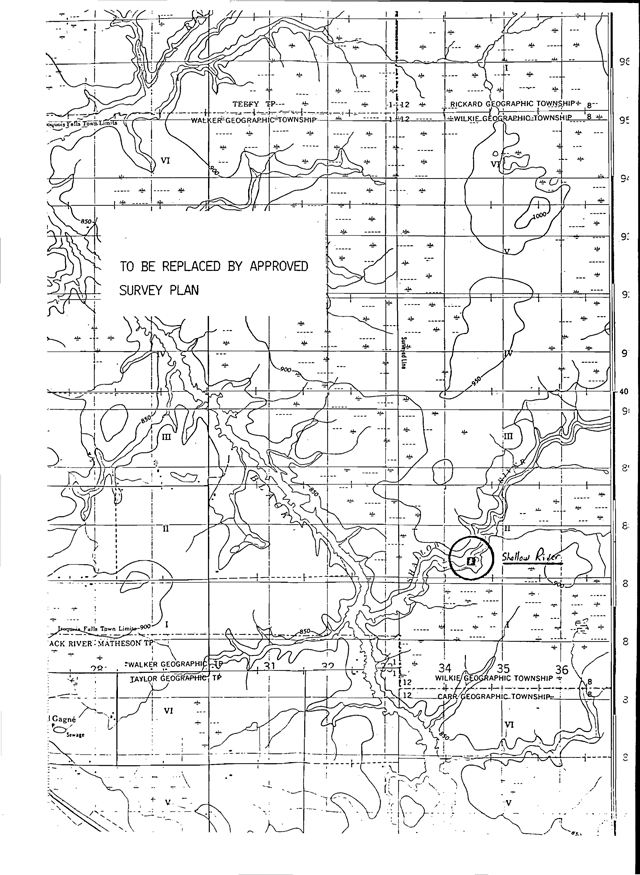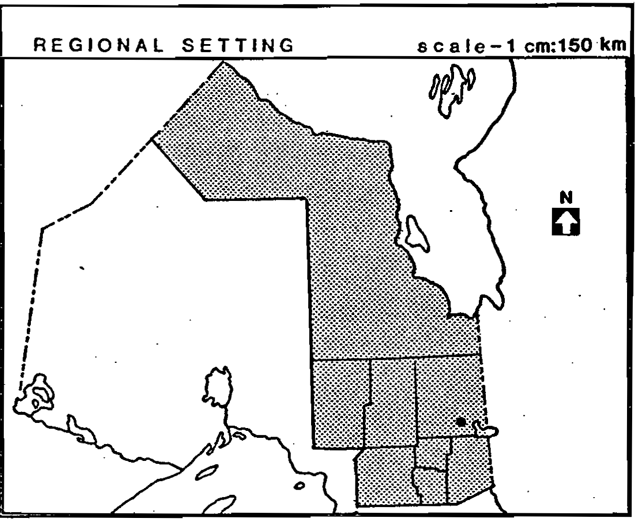Shallow River Provincial Park Management Statement
This document provides policy direction for the protection, development and management of Shallow River Provincial Park and its resources.
ISBN 0-7729-0167-8
M.N.R. 3303
March, 1985
Regional Director’s approval statement
I am pleased to approve this Interim Management Statement for Shallow River Provincial Park.
This Statement will provide direction for the management of Shallow River Provincial Park until a Park Management Plan is completed. It will also set the general direction for the preparation of the more detailed management policies that the Management Plan will contain.
R. A. Riley
Regional Director
Northern Region
A map of the location of Shallow River Provincial Park

Background
- Name: Shallow River
- Proposed class: Nature Reserve
- M.N.R. district: Cochrane
- M.N.R. region: Northern
- Area (ha): 2.25 ha
- Site region: [no information provided]
- Site District: [no information provided]
- Date in regulation: [no information provided]
A map of the regional setting of Shallow River Provincial Park

Life science target
- Site type/landscape unit: [no information provided]
- Species/communities: [no information provided]
Earth science target
- Geological theme: Quaternary - Late Wisconsinan
- Feature: Frederick House and Connaught varved clay sequences of Barlow-Ojibway Formation.
Cultural resource target
- Theme: [no information provided]
- Theme segment: [no information provided]
Recreation opportunities target:
- Day Use: [no information provided]
- Car Camping: [no information provided]
- Wilderness back country: [no information provided]
Inventories
| Level/type | Earth science | Life Science | Cultural | Recreational |
|---|---|---|---|---|
| Reconnaissance completed | Yes | No | No | No |
| Detailed completed | Yes | No | No | No |
| Required | No | No | No | No |
Potential resource use conflict
[no information provided]
Material appended
- D.L.U.G. extract: Yes
- Checksheet: [no information provided]
- Other: background information
Management statement
1.0 Issues
There are no relevant management issues for this park.
2.0 Resource management guidelines
2.1 Mineral resources management
Analysis
The nature reserve status of the park protects it from any form of degrading land use/ activity including such forms of surface exploration/mining as open pit mining.
Guidelines
Geological research may be authorized by the district manager provided that such activity enhances knowledge/understanding of the gelogical features, and that the results of such work are made available to M.N.R.
Mineral exploration/ extraction will not be permitted.
Recommendation
That the guidelines be implemented with the approval of the plan.
2.2 Wildlife management
Analysis
The park falls within trapline CC-40.
Guidelines
As hunting and trapping pose no threat to site values, these activities will be permitted.
Recommendation
That the guidelines be implemented with the approval of the plan and following appropriate changes to regulations under the Game and Fish Act.
2.3 Vegetation management
Analysis
The park contains no known significant vegetation sites.
Guidelines
Silviculture which enhances the park’s geological features will be permitted.
Recommendation
That the guidelines be implemented with the approval of the plan.
2.4 Land management
Analysis
The park is within the boundaries of the Town of Iroquois Falls.
Guidelines
Zoning and management guidelines in the Town’s official plan should conform to the guidelines presented in this plan.
Recommendation
That the official plan be reviewed for consistency with park programme objectives for the site.
3.0 Client services management guidelines
3.1 Information: Basic information about Shallow River Provincial Park will be produced for geologists and students. Specifically, a small leaflet providing information about access, the park’s significance, references, and so forth, using photos, access and geological maps, and text should be adequate.
3.2 Education: Prospective visitors should be warned of the resource’s vulnerability to damage from collectors; for example in any publication which is produced for the park.
3.3 Development: The existing restricted access to the site is beneficial in terms of minimizing human impact on the resource. Therefore, no development is proposed.
4.0 Research
The Ontario Provincial Parks Planning and Management Policies describes scientific research policy in nature reserves as follows (NR-IV-10).
Scientific research by qualified individuals, which contributes to knowledge of natural history and to environmental management, will be encouraged in Nature Reserves.
All research progammes will require the approval of the Ministry of Natural Resources and must also meet all reguirements under applicable provincial and federal legislation. The Ministry may approve the removal of geological samples by qualified researchers. Approved research activities and facilities will be compatible with protection values in individual Reserves, and will be subject to development and management policies for Nature Reserves unless special permission is given. Sites altered by research activities will be rehabilitated as closely to their previous condition as possible.
Appendix 1: Natural resources background information
Frey (1980) appraises the park’s earth science features as being of national significance according to the follow rationale.
(This section contains a stratigraphic type section (holostratotype) of the Barlow-Ojibw Formation (Quaternary, Late Wisconsinan). A total of 12.7 m vertical thickness of glaciolacustrine varved sediments are exposed. They overlie glaciofluvial sand and the glacially deposited lower till of the Great Clay Belt. This section is the internationally recognized reference to the upper part of the lower varved clay sequence and the entire overlying Frederick House and Connaught varved clay sequences of the Barlow-Ojibway Formation.
Appendix 2: District land use guidelines
17 a-h Earth science nature reserve features
a. Area description
Earth science nature reserves are relatively small, significant or representative areas that are identified to achieve part of the Ministry’s protection heritage appreciation objectives.
Across the Cochrane District, eight such sites have been identified outside of provincial parks and park candidates. These areas are:
| Site | Township | Area (ha.) | Significance |
|---|---|---|---|
| a | Hobson | 4 | Provincial |
| b | Hobson | 0.7 | Provincial |
| c | Valentine | 1.5 | Provincial |
| d | Valentine | 2.44 | National |
| e | Valentine | 2.44 | Provincial |
| f | Pitt | 2.44 | Provincial |
| g | Benish | 1.22 | National |
| h | Wilkie | 1.22 | National |
These various geological features cover an area of 15.96 hectares in total. Six of these areas have reserved flooding rights that are held by Ontario Hydro.
Three of these sites are nationally recognized standard reference sections for various Earth science formations. The other five are provincially recognized.
b. Land use intent
These areas are being recommended for park status.
Due to the size of the areas, and given the variety of uses that are ongoing within them, it is further recommended that most of the ongoing activities within the areas be permitted to continue. The exception to this would be commercial logging which is not recommended as a continuing use. An outline of these ongoing activities which are recommended for continuation is given in the Land Use Activity section, however it must be realized that in some instances further refinement may be required.
c. Land use activity for area no. 17a-h - Earth science nature reserve features
| Activity | Acceptable | Recommended Guidelines |
|---|---|---|
| Aggregate Extraction | No | Not applicable |
| Agriculture | No | Not applicable |
| Bait fishing | No | Not applicable |
| Commercial | No | Not applicable |
| Cottaging | No | Not applicable |
| Crown land recreation | No | Not applicable |
| Forestry | No | Not applicable |
| Hunting | Yes | It is recommended that hunting be permitted to continue |
| Mining | No | Not applicable |
| Provincial parks | Yes | Recommended for park status |
| Roads | No | Not applicable |
| Rural residential | No | Not applicable |
| Sport fishing | Yes | It is recommended that sport fishing be permitted to continue. |
| Tourism | No | No commercial facilities will be allowed |
| Trapping | Yes | Not applicable |
| Wildlife viewing | Yes | Not applicable |
| Wild rice harvesting | No | Not applicable |
| Urban development | No | Not applicable |
| Other | Yes | The Ministry will continue to work closely with Ontario Hydro concerning the planning and design of any future hydraulic proposals in the area. |
References
Frey, E. Candidate Earth Science Nature Reserves, Northern Region (unpublished), 1980.
Hughes, O.L. Surficial Geology of Part of the Cochrane District, Ontario, Canada in International Studies on the Quaternary (H.E. Wright, Jr. and D.G. Frey), Geological Society of America, Special Paper 84, 1965.
INQUA. Quaternary Stratotypes of North America, Volume l, Subcommission on North American Quaternary Stratigraphy, International Union for Quaternary Research, 1977.
Ontario Ministry of Natural Resources. Cochrane District Land Use Guidelines, Background Information, 1981.
Ontario Ministry of Natural Resources. Cochrane District Land Use Guidelines, Proposed Policy and Planning Options, 1983.
Ontario Ministry of Natural Resources. Ontario Provincial Parks Planning and Management Policies, 1978.
Ontario Ministry of Natural Resources. Report of the Task Force on Parks System Planning, Volume 1 1981.